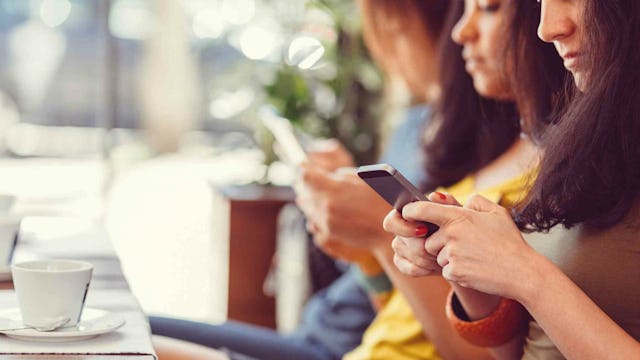Study Reveals That 'Phubbing' Can Damage Our Most Important Relationships

I’d had a hell of a day, flying solo with sick kids.
They were constantly bickering, they skipped naps, and by 3 p.m., I was ready to pull my hair out.
“Okaaay, everybody! Mommy’s turning on Daniel Tiger!” I announced, throwing a box of pizza on the floor.
I crashed on the couch, pulled out my phone, and for the first time in 10 hours, felt like I could breathe. I was busy scrolling through status updates and catching up with old friends when I felt a tug-tug-tug at my pants.
“Mommy?” my son asked.
“What is it, Ben?” I responded, without looking up from my phone.
“Mommy?” His voice was a little more urgent.
“I thought you wanted to watch Daniel Tiger,” I responded, annoyed.
“Mom—”
“What, Ben?!” I tossed my phone aside and made an exasperated sigh. All I wanted was one freaking minute of uninterrupted escape.
Was that too much to ask? Apparently so.
“Nevermind,” my 4-year-old responded with a sniff. “I just wanted to snuggle with you.”
Pow. Mommy-guilt punch to the gut.
And I deserved it too. Because I know better.
I pulled my kid in for a hug and apologized. Not just for my crappy attitude, or for raising my voice, although those two things certainly merited an apology.
I said sorry for ignoring him while I was staring at my phone. I know how bad that hurts.
I hate being phubbed.
“Phubbing,” according to the Washington Post, is the practice of snubbing people in favor of a mobile device. With over 90% of Americans now carrying cellphones, chances are good that you’ve been party to “phone snubbing,” either as the offender or the victim, likely both.
And as much as we all love having access to convenience and connectivity, let’s be honest: We also know how much it sucks to find yourself talking to the back of somebody’s cellphone.
In a study powerfully entitled, “My life has become a major distraction from my cell phone,” researchers Meredith David and James Roberts have reached the (unsurprising) conclusion that using cellphones in the presence of others can profoundly damage those relationships — probably why I was feeling so much guilt when I did it to my son.
I don’t want my children to feel ignored, and I certainly don’t want them to model this behavior either. The truth is, I’ve phubbed my family before, and I’m sure I will again. But now that this crappy behavior has a name, I’m going to try harder to recognize it and nip it in the bud. I want to do better for my kids.
I’ve always believed in the premise that the eyes are the “window to a man’s soul.” And if that’s true, how could we expect anyone to have a relationship with us when our eyes are married to a smartphone screen? It’s not possible, y’all. And the facts really back this up.
According to the data collected, phubbing is associated with lower marital satisfaction, greater instances of relational conflict, and a markedly increased likelihood of depression.
I mean…wow. Checking that phone in the middle of family dinner is seeming worse and worse, isn’t it?
There is an incredible irony here. Social media has become a way for us to connect online, while simultaneously disconnecting us from our “IRL” relationships. Here we all are, staring into our cellphones, trying to interact with people and feel loved. And there they are, the actual people we love most, staring at the back of our phones.
Sigh.
I don’t know about you, but I don’t want my kids to live in a world in which real life relationships feel like a distraction from social media. And I don’t want them to feel like they were ever that distraction for me.
As a parent, my goal is to send them out of my home confident in my love. I also want them to have good social skills and the ability to look people in the eyes to build their relationships. This new study proves that phubbing is counterintuitive to all of my parenting goals, and for that reason, I’m putting down my damn phone tonight.
Maybe we all should.